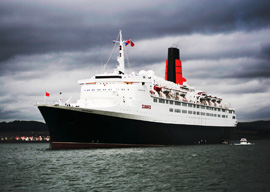
September 03, 2016

QE2
Source: Wikimedia Commons
Just about this time of year, 42 years ago, Dunhill’s of London, the famed tobacconist, had a bold idea. The president of Dunhill’s, Richard Dunhill, flew 32 backgammon players to New York and had them board the QE2 for the return trip to Southampton. The backgammon players were a varied group. Like with cricket of old, there were gentlemen and there were players. For players, read: hustlers and small-time con men. Among the gents were players like Michael Pearson, now Lord Cowdray; some very nice Americans, like Porter Ijams, whose aunt was canonized; and yours truly. The hustlers were a more amusing bunch. There was Jean-Noël Grinda, a French tennis player who was 6 feet 7 inches tall and took up more space than a lifeboat, and his “close collaborator,” Philip Martyn, now posing as a gentleman. Grinda and Martyn were partners in crime but pretended not to know each other (“Je ne connais pas ce monsieur”). There was also a small dark person called Joseph Desiree Dwek, possessor of five passports—Israeli, Lebanese, Egyptian, British, and U.S.; the American Tim Holland, a golfer friend of Sean Connery’s; and the eventual winner, Charles Benson, an old Etonian who made his living tipping losers for a grubby Fleet Street daily. (Benson was my first English friend, and he cost me plenty.)
First prize was 100,000 pounds, an enormous sum at the time, and the “players” took it very seriously. The rest of us were busy getting pissed and chasing the few women on board. (I didn’t win the tournament but won something better.) Meanwhile, back in Blighty, Nigel Dempster was featuring a life preserver form over his gossip column in the Daily Mail and announcing the results after each day’s play with caustic comments included. Nigel had approached me and had asked if I would ring him daily with news from on board. I obliged, as I had just finished close to four years in Vietnam, Palestine, Jordan, and Cyprus reporting for Greek and American papers and was looking for an entry into Grub Street.
The trouble was that Nigel, a good friend, referred to me as “his spy on board,” without giving the poor little Greek boy any credit. One day, while recovering from the night before—a friend of Pearson’s had streaked the length of the QE2 and was lustily booed by us because his willy was that of a 4-year-old—there was a knock on my cabin door. In came Clement Freud, bug-eyed and looking like Orlando Furioso. I was no friend of Freud’s and was not particularly pleased to be woken up by a dog food salesman. “We have reason to believe that you have been leaking information about the tournament to the Daily Mail,” said the dog food man. I got so angry to be interrogated by that deeply unpleasant—and, as it turned out—child-molesting creep, I advanced toward him, but he saw danger in the horizon and saw himself out unassisted.
There was nothing illegal nor unethical in my ringing Nigel every day with the results. Dunhill’s, after all, was advertising the onboard tournament to its heart’s content. Freud was simply being Freud and sucking up to the QE2 because Nigel had criticized the food and the service on board. Nothing very bad, just what I had told him—that neither were up to par, as I had crossed on the old Queen with my parents twenty years before.
Upon arrival in Southampton, Benson, deeply in debt but 100 grand richer, was greeted like a conquering hero by at least twenty bookies he owed vast sums to. He was allowed to keep enough change for a second-class train ticket home. I was asked to meet with a QE2 PR man, but I told the gofer he sent to contact me to blow it out his ass. Life returned to normal back at Aspinall’s where the whole scheme was hatched in the first place. Three years later I began my column in The Spectator.
The reason I bring all this stuff up is to show you how reporting has changed. Gawker.com has just been shuttered following a lawsuit by Hulk Hogan, backed by the billionaire Peter Thiel. I am on Hulk’s side. Gawker’s head, a Brit called Nick Denton, decided that European libel and privacy laws were too constraining, so he went to America and pushed the envelope to cringing levels. This was called transformational innovation, but it was dirt, pure and simple, that made Gawker a success and the sleazeball Denton a rich man. He claimed that his journalism “afflicted the comfortable.” That was pure bullshit. He dished nothing but dirt about people who didn’t seek the limelight—along with those who did—and created a mentality, like that of the odious Private Eye, that everyone has terrible secrets and is basically a crook. Reflexively attacking people without ever giving them the right to respond or the benefit of the doubt is pure, unadulterated sleaze in my book, practiced by those not talented or good enough to play it straight. Basically it’s close to blackmail.
Forty-two years ago I criticized some of the service on board and a bully like Freud tried to shut me up. Now we have people defending Denton, a man who has ruined lives and enriched himself on the pain he has inflicted on others. I’m as happy he was forced to sell as I was to tell Freud where to get off. But Denton’s sleaze does make Freud look like an angel by comparison.